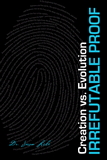The Elusive Origin of Life
Originally published in Creation 17, no 1 (December 1994): 13.
An article in Scientific American in 1991 was headed with the inappropriate title, 'In the beginning.' It should've been titled 'The Elusive Origin of Life.'
'The Elusive Origin of Life' should have been the title of an article in Scientific American for February 1991 (pp. 100-109), but which was actually headed with the most inappropriate title, 'In the beginning ...'. Yet the article presented a good comprehensive survey of a number of recent theories on how life on Earth is supposed to have begun without a Creator.
'Scientists are having a hard time agreeing on when, where and—most important—how life first emerged on the earth', the article began. 'The problem of the origin of life has turned out to be much more difficult than I, and most other people, envisioned', said Stanley Miller, who was generally promoted (to laymen) as having made life in a test tube as long ago as 1953, simply because he had synthesized a mixture of amino acids in a controlled laboratory experiment.
The article looks at some of the recent theories on the origin of life, and discards them one by one. It also points out some problems that a theory must overcome. 'There is a hitch ... proteins cannot form without DNA, but neither can DNA form without proteins. To those pondering the origin of life, it is a classic chicken-and-egg problem. Which came first, proteins or DNA?'
Among very recent theories reviewed is one by Günter Wächtershäuser, who suggested that the first cell might have been a grain of pyrite enclosed in a membrane of organic compounds. But he admitted that it is 'pure speculation'.
In C.R. de Duve's book, Blueprint for a Cell, the author advanced his theory that the first cell was based on sulphur-based compounds called thioesters in the primordial ooze. A comment on this theory came from A.G. Cairns-Smith, who said 'this process makes the oceans less suited for the synthesis of organic molecules', while he preferred his own pet theory that attributes the origin of life to supposed purposeful activity among molecules of crystalline clay.
As with the theory of evolution itself, the chief critics of each theory of the origin of life are the proponents of the latest theory, who are not slow in pointing out the errors of earlier, often widely accepted, theories.
Stanley Miller was asked, 'Do you ever entertain the possibility that genesis was a miracle not reproducible by mere humans?'
'Not at all', he replied, 'I think we just haven't learned the right tricks yet.'
Surely 'learning the right tricks' would be a miracle itself. How sad that so much thought, energy and expense is being wasted on so fruitless a quest, when the answer has been known for thousands of years from the book of Genesis. The title used in Scientific American should have added two more words to make good sense—'In the beginning God created.'
Recommended Resources

Answers in Genesis is an apologetics ministry, dedicated to helping Christians defend their faith and proclaim the good news of Jesus Christ.
- Customer Service 800.778.3390
- Available Monday–Friday | 9 AM–5 PM ET
- © 2026 Answers in Genesis



